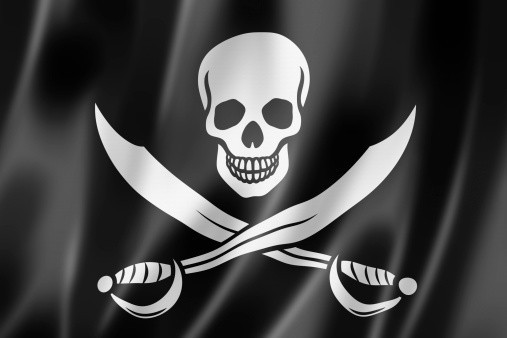 Talk Like a Pirate Day, the crazy scallywag”holiday” officially celebratedevery year on Sept. 19, has grown into a global phenomenon.
Talk Like a Pirate Day, the crazy scallywag”holiday” officially celebratedevery year on Sept. 19, has grown into a global phenomenon.
There are now even more ways to celebrate the mystique, legend, and appeal of the fiction and nonfiction characters in pirate lore that are universally loved by both young and old, hip and unhip, male and female, and everyone alike.
To celebrate this fine holiday, whether it be by changing your language settings on Facebook (yes you can do that and it is highly recommend it at all times) or letting your pirate freak flag fly, we decided to mark this festive day in the best way only marketers can do — by writing the Gigasavvy Pirate Style Guide.
If you are going to talk pirate you may as well do it right. Savvy?So, whether you want to talk like a pirate everyday or just for today, here you go.
Jack Sparrow would be proud.
How to Talk Like a Pirate
Step#1: Foundations of Sentence Structure
The Power of Be
“Be” is a biggy in pirate. In the olden days, “be” was not always subjunctive. It was an independent verb that existed alongside am, is, art, and are, and, as a result, one could say either I am or I be. Think back to old English, in the poetic days where an old scotsman or irishman would say things like “what it be?” (meaning “what is it”) or “whatever you be” (meaning “whatever you are”). In pirate, this emphasis on “be” likely came from this type old English, where, despite subtle distinctions between all of these, in pirate it was ignored to keep things simple. Is, am, and are were replaced with “be” and it was never conjugated. So “to be” – is always “be ye,” and for negatives, you have two options—not or aint.
In short, getting your be’s down is a huge part of pirate talk because it replaces almost all forms of helping verbs. Here is a little cheat sheet to help:
I am = I be
You are = You be
He is = He be
It is = It be
We are = We be
They are = They be
I be = I not be or I aint be
You be = You not be or you ain’t be
He is not working = He not be working
Step #2:Deleting and Adding letters
A lot of pirate talk may look odd, but it really does follow a distinct pattern. Most of the time changes in word usage boils down to simply adding or deleting certain letters. Here are a few of the most notable:
Talking = Talkin
ing is always changed. Ing will always be changed to in.For example, “fixing” becomes “fixin.” As in, I be fixin to…
Working with R
A lot of words that end in a vowel will end in an “r” instead of said vowel. So to becomes ter.Also worth noting is that a word ending in “r” right after a vowel often gets shortened (and vowels replaced). For example, your becomes yer.
From here we can start to make a sentence that will look something like:
I be fixin yer…
Step #3: Aye vs. Aye Aye vs. Arrrr vs. Arghhhh
This is the quintessential pirate talk that everyone should know, but most everyone gets confused. If you only learn one thing today, learn this! There is a pretty big difference between “aye” and “aye aye”? The same holds true for “arrrrrrr” and “arrghhhhh.” This is subtle, but important. No true pirate gets this wrong.
Aye! – “Why yes, I agree vehemently with everything you just said.”
Aye aye! – “Yes sir.”
Arrr! – “Arrr!” can mean a variety of things including “yes,” “I agree,” “I’m happy as a clam,” “I’m enjoying this rum,” etc.
Argghhhhh! – This can mean, “I am hurt,” “I am mad,” “I am really really sad,” and, “Oh facepalm what the blimey hell did you just do?”
Common Words and Phrases
Here are some words and phrases that are used quite often amongst pirates. Memorize these by heart; they may come in handy.
Becalmed: Not moving, stationary
Ter flounder:To sink
Blow me down: Oh my gosh
Blow a man down:Refers to killing someone
Belay yer carousin’: Stop messing around
Ye scallywags:You rascals.
All me duty to you, Cap’n: Hello, Captain
Nay: No
Ye bilge rats: You lowlifes
Me hearty: My great friend
A fine gentleman of fortune be ye:You are a great pirate
Dead men tell no tales: Leave no survivors
Plunder: To rob, steal, and generally make off witheveryone’s loot.
Booty:Treasure and loot.
Three Sheets to the Wind – We still use this today. It means someone has had far too much rum or grog and is now drunk, drunk, and more drunk.
Now we can start making sentences:
I be fixin yer ship ye bilge rats!
To make more phrases and sentences, and to achieve full fluency in pirate, here is a handy glossary of more buccaneer and pirating terms you should know.
Glossary
BUCCANEER: A pirate, especially one that preyed on Spanish shipping in the West Indies during the 17th century.
CAST-AWAY: Shipwrecked.
DAVY JONES: The dark spirit of the sea. There are many legends referring to Davy Jones. We will just go with the Pirates of the Caribbean one.
DAVY JONES’S LOCKER: Literally the storage area of Davy Jones at the bottom of the sea. Where everything thrown overboard ends up, including the bodies of sailors buried at sea and lost treasure.
St. ELMO’S FIRE: Electric light seen flickering about the masts and rigging during a storm.
FATHOM: The full reach of a man with arms extended. A measure of six feet used to mark the depth of water using a lead or sounding line.
HAIL: To call another vessel, usually to ask where she comes from and where she’s going. A traditional pirate hail is “Hove-to or we’ll blow you out of the water.”
JACK: The British Union flag but also Jack or Jack Tar are familiar terms for an ordinary sailor.
JOLLY ROGER: A pirate flag often black with the skull-and-crossbones.
KNOT: A measure of the ship’s speed made by counting the knots on a log-line paid out to a float for thirty seconds. A ship travelling at 8 knots is moving 8 nautical miles an hour.
LEAGUE: A distance of three nautical miles.
LETTER OF MARQUE: A document given to a captain allowing him to attack enemy ships under the authority of the crown, in return for a cut of the loot or plunder. It makes a pirate sort of legal if you’re on the right side. This was a little like the a pirate mafia having deals with political leaders.
MAROONING: Abandoning a person on a deserted coast or island with very few supplies. Usually resulting in a slow death by starvation or thirst. If you were rescued you wouldprobably be hung because people presumed you were a pirate.
MUTINY: Revolt or determined disobedience on a ship. Punishable by death in the British Navy.
SCURVY: A common disease among sailors caused by vitamin C deficiency causing bleeding gums and skin as well as extreme weakness. The British Navy gave their crews lime juice to counteract scurvy, which is why they were called “limeys” by the American sailors.


